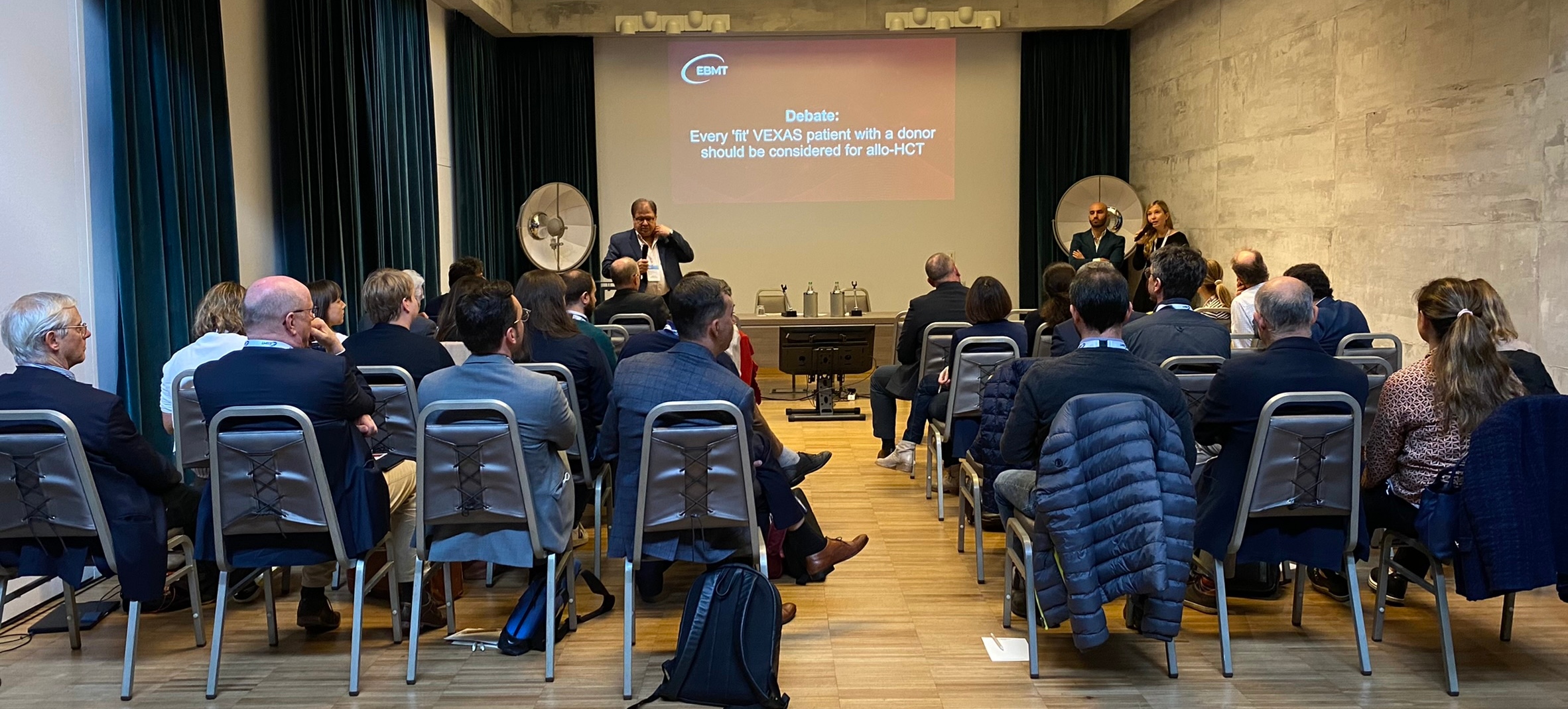
Summary report written by Joanna Drozd-Sokołowska, Kavita Raj (CMWP Co-Secretaries) and Donal McLornan (CMWP Chair)
We were delighted that the CMWP Scientific and Educational meeting took place in Milan between 30th September- 1st October 2022.

On the first day, we had a very succesful scientific business meeting focusing on our research project portfolio. Dr. Donal McLornan (London) and Professor Francesco Onida (Milan) remembered our late colleague Dr. Anna Waszczuk-Gajda and our collective thoughts were with her young son, husband, family and colleagues
On the second day, the sessions started with a warm welcome by Dr. Donal McLornan, chair of the CMWP, and Professor Francesco Onida, the local organizer, followed by an overview of the CMWP structure and activities given by Dr. Kavita Raj (London) and Dr. Joanna Drozd-Sokołowska (Warsaw), the CMWP co-secretaries.
First, Dr.Marie Robin (Paris) spoke on the role of NGS and MRD in allo-HCT for MDS, providing an in-depth overview of the frequency of somatic mutations and their impact on the outcome of allo-HCT in MDS patients, introducing also the new molecular IPSS (IPSS-M) and how this could be applied to the MDS transplantation algorithm.
Next, Professor Francesco Onida (Milan) gave a talk on the indications for allo-HCT in patients with MDS/MPN overlap syndromes. As summarised in the presentation, there are multiple different prognostic indices in CMML, and additionally, he discussed the impact of the mutational landscape on outcomes. Professor Onida also presented the newest results from the recently published international collaborative analysis and highlighted the EBMT CMML transplant score to facilitate patient counseling. Finally, a very useful transplant algorithm for CMML was provided.
Next there was a lively debate as to whether every 'fit' VEXAS patient with a donor should be considered for allo-HCT. The debate was chaired by Professor Ibrahim Yakoub-Agha (Lille), the former CMWP chair; Dr. Carmelo Gurnari (Rome) spoke in favour of ‘yes’ and Dr. Raffaella Greco (Milan), current chair of the ADWP, against. Dr. Gurnari presented an overview of VEXAS, demonstrating the association between VEXAS and MDS, CMML, and also myelofibrosis. Dr. Gurnari expertly summarized the non-transplant therapies for VEXAS (steroids, ruxolitinib, HMA), indicating that none of those could cure VEXAS and that solely a symptomatic improvement was achievable. Finally, Dr. Gurnari summarized the world’s experience with allo-HCT and “advertised” the two prospective trials run for HCT in VEXAS. Dr. Raffaella Greco, defending the “no”position, presented a case of a patient who had been treated for VEXAS without allo-HCT. Dr. Greco discussed the therapeutic approaches to VEXAS, one approach targeting and eradicating the UBA1 clone, and the second inhibiting downstream inflammatory pathways and hypercytokinaemia. She summarized the EBMT experience with allo-HCT for autoimmune disease. The decision to proceed to allo-HCT should be made by a multidisciplinary team, including both rheumatologists and hematologists.

In the second session on Plasma Cell Dyscrasia, chaired by Professor Meral Beksac (Ankara) and Dr Laurent Garderet (Paris) there was a debate on the placement of CAR-T in the autoHCT algorithm for myeloma. Nico Gagelmann (Hamburg) expertly defended the statement “the earlier the better”, while Patrick Hayden (Dublin) strongly defended the opposite position with a rational placement of novel therapies. This was a lively and throught provoking debate that generated much discussion.
After a short coffee break, we continued with the session on Myeloproliferative Neoplasms, chaired by Dr Nicola Polverelli (Brescia) and Dr Tomasz Czerw (Gliwice). Professor Nicolaus Kröger (Hamburg) gave a presentation on optimising haploidentical allo-HCT in Myelofibrosis. He presented the problem of high non-relapse mortality rates in haploidentical allo-HCT for MF, with graft failure, both primary and secondary, posing the most important problems. Potential solutions to be examined were multiple, including intensification of the conditioning protcoles for suitable individuals or adding ATG to PT-Cy. Professor Kröger additionally stressed the problem of no clear definition of graft failure in such settings, questioning the utility of the lack of neutrophil engraftment by day 28. And how perhaps we should be considering earlier time points. Next, Dr. Francesca Palandri (Bologna) gave a very stimulating presentation on whether novel agents could truly lead to disease modification in myelofibrosis. By presenting surrogate biomarkers for disease modification, and the role of inflammatory cytokines in MF, Dr. Palandri presented the currently available and novel drugs in myelofibrosis outside of the transplant setting.
Having energized ourselves during the excellent lunch break, we were definitely ready to absorb yet more knowledge The last session on ‘Hot topics in CML and CLL’ was chaired by Professor Yves Chalandon (Geneva) and Dr. Michel van Gelder (Maastricht). Dr. Hugues de Lavallade (London) gave a stimulating talk on NGS for kinase domain (KD) mutational analysis in CML. Dr. de Lavallade provided the background for the NGS KD mutational analysis, by presenting the cases of patients with low-level BCR::ABL1 KD mutations. He emphasized that KD mutations could arise in patients with CML chronic phase very early after starting TKI, which required an early TKI switch to prevent progression. Lastly, Professor Oliver Tournilhac (Clermont-Ferrand, France) gave a presentation on whether the advent of CAR-T for CLL would completely displace allo-HCT. Professor Tournilhac first provided an introduction to the changing treatment landscape in CLL. Afterwards he expertly discussed the challenges associated with the production of CAR-Ts in CLL and the potential ways to improve their therapeutic efficacy, e.g., ibrutinib, inhibiting BET bromodomains, or disrupting TET-2. Finally, competitors to CAR-T were introduced (bispecifics, non-covalent BTKis).
Dr. Donal McLornan thanked all the participants and brought to a close a stimulating day of exploring state of the art transplantation and cellular therapies. We all thanked once more Professor Francesco Onida and the EBMT events and education team for a wonderful, stimulating and energising face-to-face meeting.
We plan our next business and educational meeting virtually in January 2023, with a special focus on MDS and overlap syndromes, and we look forward to meeting again in person at the next EBMT Annual General Meeting in Paris in April, and afterwards in Hamburg in September 2023, during a 3-day meeting dedicated to plasma cell disorders and CAR-T in PC disorders alongside the Cellular Therapy and Immunobiology working party (CTIWP).